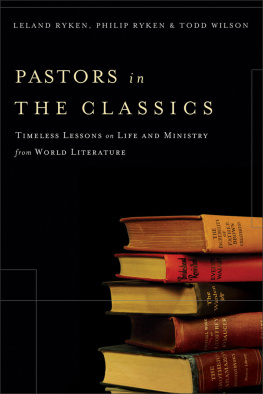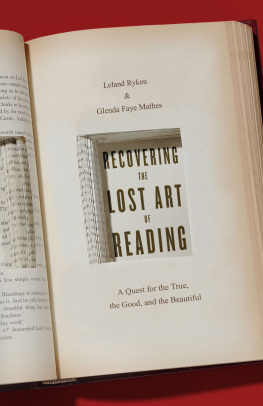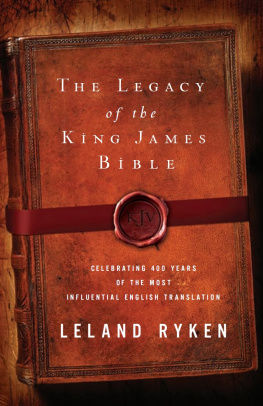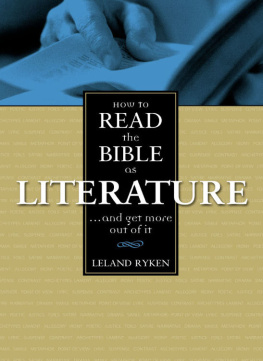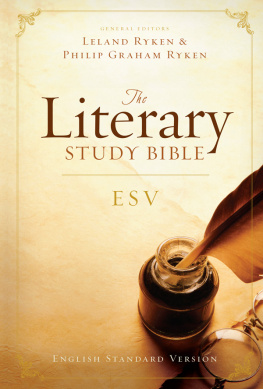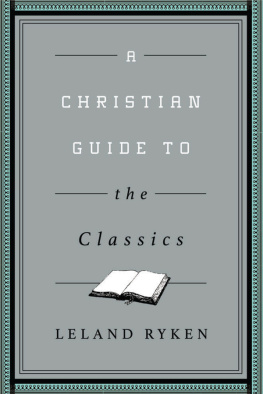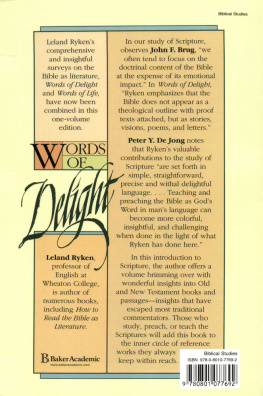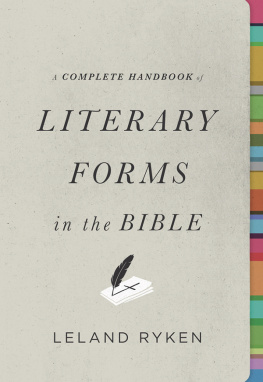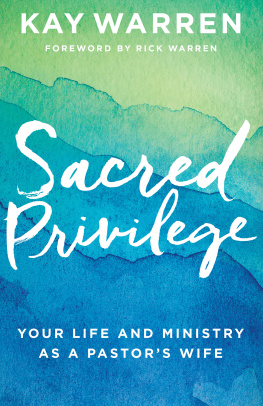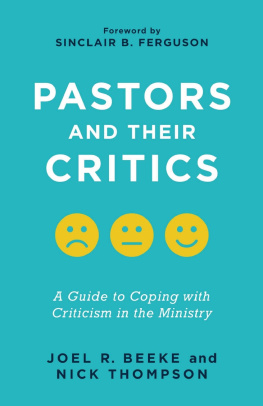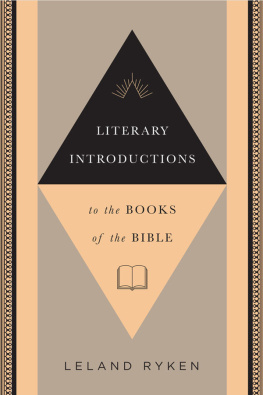
2012 by Leland Ryken, Philip Ryken, and Todd Wilson
Published by Baker Books
a division of Baker Publishing Group
P.O. Box 6287, Grand Rapids, MI 49516-6287
www.bakerbooks.com
Ebook edition created 2011
All rights reserved. No part of this publication may be reproduced, stored in a retrieval system, or transmitted in any form or by any meansfor example, electronic, photocopy, recordingwithout the prior written permission of the publisher. The only exception is brief quotations in printed reviews.
ISBN 978-1-4412-3588-6
Library of Congress Cataloging-in-Publication Data is on file at the Library of Congress, Washington, DC.
Unless otherwise indicated, Scripture quotations are from The Holy Bible, English Standard Version (ESV), copyright 2001 by Crossway, a publishing ministry of Good News Publishers. Used by permission. All rights reserved. ESV Text Edition: 2007
Scripture quotations labeled KJV are from the King James Version of the Bible.
Our basic book is the Bible. But anyone in ministry will be further enriched by getting acquainted with the pastoral classics discussed in this book. (A classic is a distinguished book that speaks to every generation and doesnt have to be rewritten.) Whether you are new to ministry or a veteran, the books discussed in this guide can help you better understand yourself and your calling beyond what you may have learned from textbooks and lectures. These classics offer enlightenment as well as entertainment, and this book is one of the best guides I have seen. I highly recommend it.
Warren W. Wiersbe , author; former pastor, Moody Church
Many pastors know the power of a well-chosen citation from Kierkegaard or Dostoevsky when preaching to others. But for pastors who are tired, discouraged, isolated, trapped in some lethal sin, or in danger of losing their faith, here is an ideal guide to find in the classics the deepest, most relevant, emotionally gripping wisdom to preach to oneself. May God use it to revive many of us, remind us of the height from which we have fallen, and restore us to our first love.
Gordon P. Hugenberger , senior minister, Park Street Church, Boston
Pastors in the Classics is a splendid and unique guide to the portraits of pastoral ministry found in the great works of Western literature. The useful information provided here will be enlightening, and the insightful commentary appreciated by anyone who has ever pastored a flock. Lovers of great literature will find their reading more enjoyable and their understanding deepened by this satisfying work.
Devin Brown , department of English, Asbury University;
author of Inside Narnia
We come to know ourselvesand othersthrough stories. Here the authors invite us into literary worlds replete with stories of pastors: pastors who preach and suffer, who sin and repent, who fail in small and spectacular ways, who stand always in need of grace. If we accept the invitation to enter these tales, we will emerge challenged and encouraged, our hearts returned to love of God and neighbor.
Susan Felch , professor of English, Calvin College
Contents
: Scandalous Clergy
: Hidden Sin and Its Consequences
: Integrity in the Face of Public Attack
: The Travesty of an Almost-Christian
: Powers and Principalities in Flesh and Blood
: The Minister as Martyr
: The Power of an Ordinary Ministry
: Can a Bad Minister Produce Good Fruit?
: The Triumph of the Gospel in a Ministers Life
: Sanctified for Service through Suffering
: Becoming like Jesus in His Death
: Finishing Well
Introduction
This book was conceived when the two authors who are pastors independently envisioned a book that explores the image of the pastor and issues of ministry in literary masterpieces. Both would-be authors also independently requested the literary scholar on the authorial team to serve as coauthor. The convergence of these ingredients was sufficient to launch the project.
What Kind of Book Is This?
This book is a road map to literary masterpieces in which the pastors experience is a major part of the story. In fact, this book contains nearly everything that a reader or discussion leader needs in order to get started on an exploration of the pastor in literature.
The first part of the book is a readers guide to twelve important literary classics in which pastors are the mainspring of the action. These masterworks were written in four centuries and cover seven nationalities. The analyses of these works go beyond description to interpretation. Furthermore, each chapter highlights a specific feature of pastoral ministry that the literary work itself puts before us. Reflection/discussion questions are part of these chapters.
The second part of the book is a handbooka reference book that defines the canon of literary masterpieces that deal with the pastors experience. The entries in this section give all the information a reader needs when selecting literary works that deal with pastors.
In summary, this book is both a readers guide to major works and a reference book containing information about the field as a whole.
Aims and Goals of This Book
The first goal of this book is to facilitate the reading of some great works of literature. We hope the works covered in this book will emerge in readers imaginations as literary delights. They are works of literature first of all and works providing insight into the pastors life within that parameter. It is important to note additionally that the works surveyed are not narrowly concerned with issues of ministry but actually cover all of life. For example, T. S. Eliots play Murder in the Cathedral portrays not only the final days in the life of a saint but also the life of the common citizens of Canterbury in their daily routine of hopes and fears.
Literature has a unique ability to speak to the whole person, and the books surveyed in this volume can teach and move readers in a way that nonliterary books about ministry do not. This is partly a difference between showing and telling. A contemporary book on issues in ministry might tell a minister not to enter into sexual relations with a woman in the congregation, while Nathaniel Hawthornes famous story shows why a minister should not do so.
Second, we chose works in which the pastors life is a major ingredient. Accordingly, the commentary focuses chiefly on the ways in which the works portray and clarify issues in the ministers life and vocation. The table of contents of this book shows at a glance the issues the respective literary works addressscandalous clergy, hidden sin in a preachers life, the dilemma of the unworthiness of ministers to do Gods work, and so forth. The books chosen for this volume can help to shape the spiritual life of people in ministry.
Third, most of the works covered in this book place the ministers life within a broader Christian context. The works thus incline toward the broad category known as Christian literatureliterature that portrays experiences that are important to Christians and that endorses Christian doctrines. For most of the works, therefore, the usual rewards of reading Christian literature will be present, including reflection on the Christian life, affirmation of a Christian worldview, and nurture of the soul. John Milton said that one of the effects of reading Christian literature is that it sets the affections [the old word for emotions] in right tune. The works discussed in this book generally make the grade and can legitimately be called devotional reading. Thus, The Scarlet Letter is a Christian classic in its portrayal of salvation, quite apart from the fact that it deals with ministerial issues.

